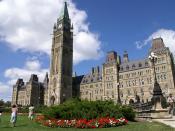The Rebellion's of Upper and Lower Canada
What economic, political, and social factors contributed to the rebellions of 1873 in Upper and Lower Canada?
There are many different factors that contributed to the 1873 rebellions of upper and lower Canada. There are immediate causes and long term factors that influenced the uprising of these rebellions. An important aspect to first consider is the French and English history in Canada. French Explorers first landed in Canada during the sixteenth century. The first permanent settlements were Port Royal, Montreal, and Quebec. French colonists came to settle the land. This new land of Canada boasted many resources such as fur, timber, and wheat. Other mother countries began to see the value of Canada's resources and a market for produced goods made in Europe. The mother countries began squabbles over who controlled which territory.
In 1759 General Wolfe in control of the British army was sent to the Plains of Abraham outside of Quebec.
By the end of the day Quebec belonged to the British Army who defeated the French General Montcalm (The Illustrated History of Canada, Wynn Graeme p.213). In 1763 Quebec was officially passed over to the British Monarch. Ben Franklin tried to pursue the French to join the American colonies but was unsuccessful. The Constitutional Act was passed in 1791. This act divided the land into two parts: Upper Canada (Present day Ontario) for the English settlers and Lower Canada (Present Day Quebec) for the French. The territory separated the French from the English to avoid conflict, the idea that the French could maintain there own institutions separate from the English. Due to the wealth of the trade industry many English merchants moved to Quebec (1837: Reveloution in the Canadas, Greg Keilty p.65).
In both Canada's the monarch was represented by...


